Comparison of Game Consoles by Sound Capabilities: Difference between revisions
| Line 121: | Line 121: | ||
|- | |- | ||
| [[Odyssey:Odyssey_Series_Wiki|Magnavox Odyssey 400]] | | [[Odyssey:Odyssey_Series_Wiki|Magnavox Odyssey 400]] | ||
|align="right"|[[File: | |align="right"|[[File:S-l1600_(2).jpg|200px]] | ||
|align="left"| OUTPUT 9V DC | |align="left"| OUTPUT 9V DC | ||
|align="left"| 100ma | |align="left"| 100ma | ||
Revision as of 18:30, 30 October 2022
The purpose of this article is to categorize video game consoles according to their supported audio formats, and to consolidate advice on optimizing sound reproduction for each of those consoles.
| DRAFT (WORK IN PROGRESS ARTICLE - PLEASE DO NOT RELY ON THE INFORMATION BELOW UNTIL MARKED AS COMPLETED) |
Explanation of Terms
Console:
An asterisk symbol (*) beside a console's name means that a Triad brand replacement power supply is available for that console. See the Triad Power Supplies page for more information.
Voltage:
Generally speaking, the "Voltage" figure on the power supply should match the official specs (below) as closely as possible. There will be exceptions to this rule, and they will be highlighted in the "Notes" column.
Amps:
As amperage refers to potential current (and the device will only draw as much as required) - the A (or the mA) figure may be higher than what the console requires to operate, but should not be lower.
The figures below do not account for additional power draw caused by various modifications, flashcart devices, wireless controllers or similar after-market additions.
Polarity:
The power supply's connector can be center-positive (C+) or center-negative (C-). They can be distinguished by the symbols which can be found, usually either on the power brick, or on the plug.
Centre-positive symbol
Centre-negative symbol
To avoid damage to the console, the user should inspect the symbol on their power supply and ensure that its polarity matches the polarity of the corresponding console (see table below).
Original PN:
The part number for the original stock power supply for a given console.
Replacement PN:
The part number for the recommended replacement power supply for that console.
Connection:
Power Supply:
Note that if the "Power Supply" column says "Internal", then that particular console has an internal power supply module that will perform a similar function to the external "power bricks" used by most retro consoles. If your console's power supply is "internal", the user just needs to find a cable that has the correct electrical plug for your region and also has the matching console-facing connector. This will often be a Figure-8 cable, but a guide to common connectors can be found here and on the IEC 60320 Wikipedia page. The user should also ensure that the console's internal power supply is rated for the AC coming out of their wall. If your console's internal power supply does not match your country's AC voltage (for example, a North American gamer using a European Dreamcast), then step-up/step-down transformers to go up/down in voltage for the target device may be a good option.
Notes:
Any exceptions to the above guidelines, or idiosyncrasies related to an individual console, should be laid out in the "Notes" column. For example, there are exceptions to the rule that voltage on a replacement should be as close as possible to the voltage on the original power supply. The Sega Genesis for instance, uses a 7805 voltage regulator to step the input down from 9V to 5V. The 7805 expects a minimum voltage of 6.5V - the significance of this is that a Genesis 2 (whose original power supply outputs 10V) will work fine with a 9V power supply.
First generation of consoles
| Console | Pictures | Voltage | Amps | Polarity | Original PN | Replacement PN | Connection | Power Supply | Notes |
|---|---|---|---|---|---|---|---|---|---|
| Magnavox Odyssey | 
|
Output: 9V DC | 400 mA | Tip positive | ? | ? | 2.5 mm TS jack | ? | The console cannot generate audio. |
| Magnavox Odyssey 100 | 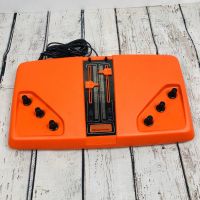
|
Output: 9V DC | 200 mA | ? | PIDB-15 | ? | 3.5 mm TS jack | ? | The console didn't send audio to the tv, instead using an internal piezzo beeper which emitted primitive action sounds through a built-in speaker - for example, a "blip" when the tennis ball is hit by a player's paddle, or when the hockey puck hits the borders of the playing area. |
| Magnavox Odyssey 200 | 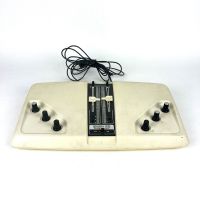
|
OUTPUT 9V AC | 100ma | ? | ? | ? | ? | ? | The console's piezzo beeper operated in the same manner as the Odyssey 100. The Odyssey 200 added an extra game called SMASH (i.e. squash); the buzzer would bleep whenever the ball hit the front "wall". |
| Magnavox Odyssey 300 | 
|
OUTPUT 9V DC | 100ma | ? | ? | ? | ? | ? | As before, the game audio (little more than a few bleeps and bloops) emanates from a speaker in the Odyssey itself, rendering it uncapturable via conventional means. |
| Magnavox Odyssey 400 | 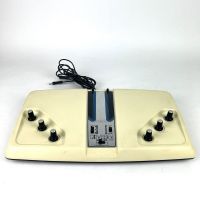
|
OUTPUT 9V DC | 100ma | ? | ? | ? | ? | ? | Console is powered by either six "C" batteries or a 9 volt AC adapter. |
| Magnavox Odyssey 500 | 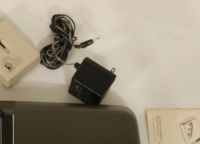
|
Output 9 volts | ? | ? | ? | ? | ? | ? | Console is powered by either six "C" batteries or a 9 volt AC adapter. |
| Magnavox Odyssey 4305 | 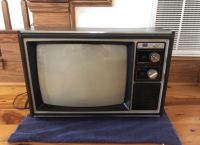
|
? | ? | ? | 701479-4 (AC/DC Power Assembly) | Unknown | Internal/Chassis-mounted | Internal/Chassis-mounted | The Odyssey 4305 is a 19” television (based on the chassis of the Magnavox T991 television) but with a built-in Odyssey. As with most CRTs of this era, the sound was an analog signal produced from small speakers installed inside the chassis. It produced sound in mono and action sounds were similar to other Odyssey series consoles. |
| Magnavox Odyssey 2000 | 
|
? | ? | ? | ? | ? | ? | ? | Console is powered by either six "C" batteries or a 9 volt AC adapter. |
| Magnavox Odyssey 3000 | 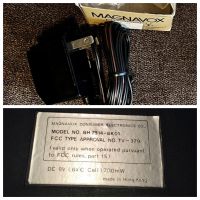
|
OUTPUT 9 volts | 78mA | ? | ? | ? | ? | ? | Console is powered by either six "C" batteries or a 9 volt AC adapter. |
| Magnavox Odyssey 4000 | 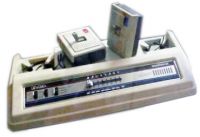
|
OUTPUT 9V DC | 100 mA | ? | ? | ? | ? | ? | Unlike most Odyssey models, the AC adapter is necessary as the console does not use batteries. |
| Philips Odyssey 200 | 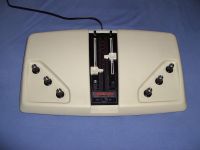
|
? | ? | ? | ? | ? | ? | ? | European release of Magnavox Odyssey 200. Unclear if batteries can be used (TBC) |
| Philips Odyssey 2001 | 
|
18,6V- | 120mA | ? | FW3009 | ? | ? | ? | Unlike most Odyssey models, the AC adapter is necessary as the console does not use batteries. |
| Philips Odyssey 2100 | 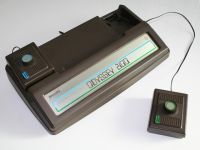
|
? | ? | ? | ? | ? | ? | ? | Unlike most Odyssey models, the AC adapter is necessary as the console does not use batteries. |
| TV Tennis Electrotennis (Epoch) | 
|
? | ? | ? | ? | ? | ? | ? | Console is completely wireless; powered by four D size batteries. |
| Atari Home Pong (Model C-100) | 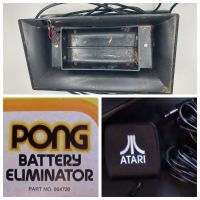
|
5.5V DC | 100 mA | ? | 004720 | ? | ? | External PSU | Console can be powered by four "D"-size batteries, or an AC adapter (“battery eliminator”) |
| Atari Super Pong (Model C-140) | 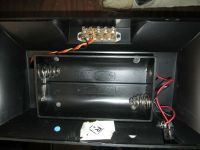
|
OUTPUT 6V DC | ? | ? | ? | ? | ? | External Power Supply Unit (6V) | The console had a speaker built into the main unit, that could output a simple "bloop" noise every time the ball was hit. |
| Coleco Telstar | 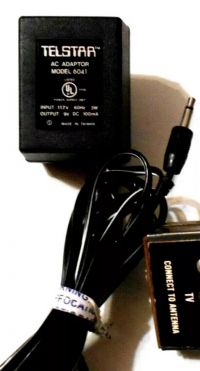
|
OUTPUT 9V DC | 100mA | ? | Model 6041 | ? | ? | ? | Console is powered by either six "C" batteries or a 9V adapter. |
| Coleco Telstar Classic | 
|
OUTPUT 9V DC | 100mA | Polarity unknown but the Atari 2600 adapter tends to be compatible. | Model 6041 | ? | Typically the tip is positive but in some units, the polarity can be reversed and the unit may need repairs following a blown transistor. | ? | Unusually for this series, the console doesn’t use batteries. The adapter is 100mA and outputs 3 watts at 60hz. |
| Coleco Telstar Deluxe | Output 9 volts | ? | ? | ? | ? | ? | ? | Console verified to operate off either a 9V adapter or six C-Cell batteries. Other details TBD | |
| Coleco Telstar Ranger | 
|
OUTPUT 9V DC | 100 mA | ? | Model 6041 | ? | ? | ? | Console is powered by either six "C" batteries or a 9V adapter. |
| Coleco Telstar Alpha | 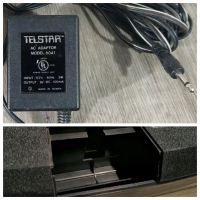
|
OUTPUT 9V DC | 100 mA | ? | Model 6041 | ? | ? | ? | Console is powered by either six "C" batteries or a 9V adapter. |
| Coleco Telstar Colormatic | 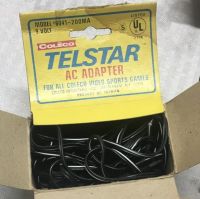
|
OUTPUT 9V DC | 200 mA | ? | ? | ? | ? | ? | ? |
| Coleco Telstar Regent | 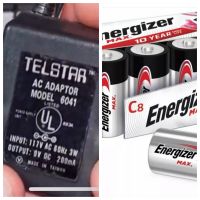
|
OUTPUT 9V DC | 200mA | ? | ? | ? | ? | ? | ? |
| Coleco Telstar Sportsman | Output 9 volts | ? | ? | ? | ? | ? | ? | Confirmed that console operates off batteries (size undetermined) and a 9V adapter. A standard Atari 2600 adapter will work. More details TBD | |
| Coleco Telstar Combat! | 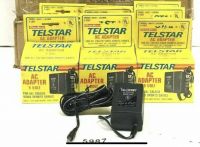
|
OUTPUT 9V DC | 200mA | ? | ? | ? | ? | ? | Console verified to run via six c-cell batteries or 9V adapter. |
| Coleco Telstar Colortron | 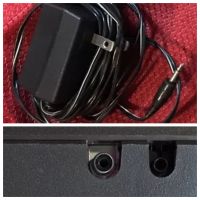
|
? | ? | ? | ? | ? | ? | ? | ? |
| Coleco Telstar Marksman | 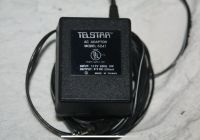
|
OUTPUT 9V DC | 200mA | ? | ? | ? | ? | ? | ? |
| Coleco Telstar Galaxy | 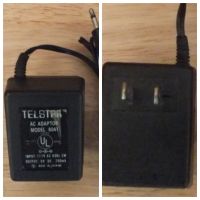
|
OUTPUT 9V DC | 200mA | ? | Model 6041 | ? | ? | ? | Confirmed that working AC adapter outputs 3W; unsure whether console has a battery compartment (TBD) |
| Coleco Telstar Gemini | 
|
OUTPUT 9V DC | 200mA | ? | ? | ? | ? | ? | Console does not have a battery compartment. Verified to work with slightly different “3W” version of the 6041-200ma Telstar AC adapter. |
| Coleco Telstar Arcade | 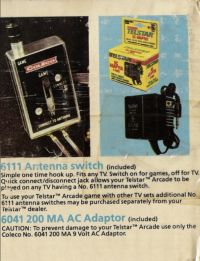
|
OUTPUT 9V DC | 200 mA | ? | Model 6041-200ma | ? | ? | ? | Possibly could also be powered by D-size batteries (unconfirmed) |
| Nintendo Color TV - Game 6 | 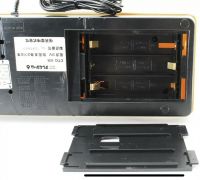
|
OUTPUT 9V DC | ? | ? | ? | ? | ? | ? | ? |
Second generation of consoles
| Console | Pictures | Voltage | Amps | Polarity | Original PN | Replacement PN | Connection | Power Supply | Notes |
|---|---|---|---|---|---|---|---|---|---|
| Atari 2600 | 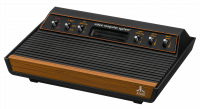
|
9V DC | 500 mA | Tip positive | CO10472 | ? | 3.5 mm TS jack | External | Different styles of this AC adapter exist, but all have the same specs and part number |
| Magnavox Odyssey 2 | 9V AC-12V AC, depending on PSU | 400 mA-830 mA, depending on PSU | N/A | ? | ? | 3.5 mm TS jack (early models) or 5.5 x 2.1 mm barrel jack (later models) | External | Multiple revisions of the Odyssey 2 AC adapter exist, each with slightly different voltage and current ratings | |
| Philips Videopac G7000 (European release of Odyssey 2) | 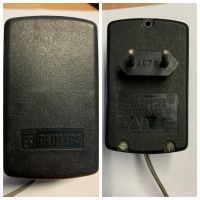
|
OUTPUT 9V DC | 1.3 A | ? | FW3300 | ? | ? | ? | External |
| Mattel Intellivision | Input: 120V AC; Output: 5V DC, 12V DC, 16V DC (unregulated), -2.1V DC | ? | N/A, power cord to electrical outlet is hardwired | ? | ? | N/A | Internal | The ribbon cable that connects the power supply to the motherboard is extremely fragile, be very careful! | |
| Mattel Intellivision II | 16.7V AC | 1 A | N/A | 5872-9629 | ? | 5.5 x 2.5 mm barrel jack | External | A variation exists with slightly lower output voltage and current ratings (16.2V AC and 955 mA) | |
| Coleco ColecoVision | 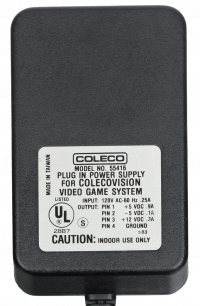
|
5V DC, -5V DC, 12V DC | 0.9 A (5V), 0.1 A (-5V), 0.3 A (12V) | N/A, connector is keyed | 55416 | N/A | Rectangular four-pin connector, same as used by the TI-99/4A computer (though not the same pinout!) | External | |
| Atari 5200 (Four controller port model) * | 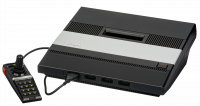
|
11.5V DC | 1.95 A | Tip positive | C018187 | WSU090-2000-13 | 5.5 x 2.5 mm barrel jack | External | The four-port Atari 5200 had an interesting "one cable" design where both the RF signal and the power ran through one coaxial cable which was permanently attached to the system. A power mod is available that allows the console to use a conventional switch box or direct RF adapter. |
| Atari 5200 (Two controller port model) * | 
|
9.3V DC | 1.95 A | Tip positive | C018187 | WSU090-2000-13 | 5.5 x 2.5 mm barrel jack | External | |
| GCE/MB Vectrex | 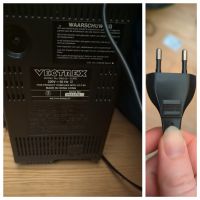
|
? | ? | N/A, power cord to electrical outlet is hardwired | ? | ? | N/A | Internal |
|
Third generation of consoles
| Console | Pictures | Voltage | Amps | Polarity | Original PN | Replacement PN | Connection | Power Supply | Notes |
|---|---|---|---|---|---|---|---|---|---|
| Nintendo Entertainment System (US) * | 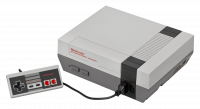
|
9V AC | 1.2 A | N/A | NES-002 | WSU090-1300 or WSU090-1300-R | 5.5 x 2.1 mm barrel jack | External | The NES will accept a DC power supply so long as the voltage and current are within spec |
| Nintendo Entertainment System (PAL) * | 9V AC | 1.2 A | N/A | NES-002 | WSU090-1300-13 or WSU090-1300-R13 | 5.5 x 2.5 mm barrel jack | External | The NES will accept a DC power supply so long as the voltage and current are within spec | |
| Famicom * | 
|
10V DC | 850 mA | Tip negative | HVC-002 | WSU090-1300-R | 5.5 x 2.1 mm barrel jack | External | Applies to both original and AV Famicom models |
| Famicom Disk System * | 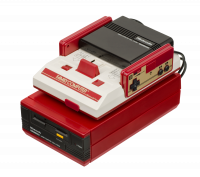
|
9V DC | 400 mA | Tip negative | HVC-025 | WSU090-1300-R | 5.5 x 2.1 mm barrel jack | External or six internal C-cell batteries | With a splitter it should be possible to run both a Famicom and Disk System from a single AC adapter without batteries; the WSU-090-2000-R is recommended for this |
| Twin Famicom * | 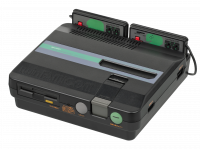
|
7.6V DC | 1.25 A | Tip positive | UADP-0041CEZZ | WSU075-1500-13 | 5.5 x 2.5 mm barrel jack | External | Please note that the Twin Famicom's power circuitry is very sensitive to input voltage, anything higher than 7.6V causes the power transistor to run very hot |
| Sega SG-1000 * | 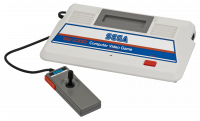
|
9V DC | 850 mA | Tip negative | SA-150 | WSU090-1300-R | 5.5 x 2.1 mm barrel jack | External | |
| Sega Mark III * | 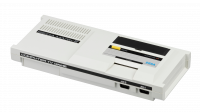
|
9V DC | 850 mA | Tip negative | SA-150 | WSU090-1300-R | 5.5 x 2.1 mm barrel jack | External | |
| Sega Master System * | 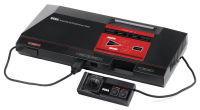
|
9V DC | 1 A | Tip negative | 3025 | WSU090-1300-R | 5.5 x 2.1 mm barrel jack | External | Different styles of this AC adapter exist, but all have the same specs and part number |
| Atari 7800 | 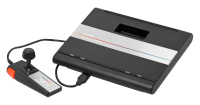
|
9V DC | 1 A | N/A, connector is keyed | CO24471-001 | ? | Two-pin keyed connector | External | Different styles of this AC adapter exist, but all have the same specs and part number |
| Casio PV-1000 * | 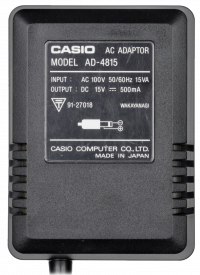
|
15V DC | 500 mA | Tip negative | AD-4815 | WSU150-0560-R | 5.5 x 2.1 mm barrel jack | External | |
| Epoch Super Cassette Vision * | 8.5V DC | 800 mA | Tip negative | N/A | WSU090-1300-R | 5.5 x 2.1 mm barrel jack | External | ||
| Amstrad GX4000 * | 11V DC | 500 mA | Tip positive | GX4000PSU/UK (UK), GX4000PSU/E (EU) | WSU090-1300 | 5.5 x 2.1 mm barrel jack | External |
Fourth generation of consoles
| Console | Pictures | Voltage | Amps | Polarity | Original PN | Replacement PN | Connection | Power Supply | Notes |
|---|---|---|---|---|---|---|---|---|---|
| NEC TurboGrafx 16 * | 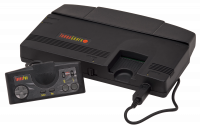
|
10.5V DC | 730 mA | Tip negative | HES-ACA-01 | WSU090-1300-R | 5.5 x 2.1 mm barrel jack | External | |
| PC Engine * | 
|
9V DC | 650 mA | Tip negative | PAD-105/PAD-106 | WSU090-1300-R | 5.5 x 2.1 mm barrel jack | External | Same information also applies to both Core Grafx models and the PC Engine Shuttle |
| NEC PC Engine CD * | 9V DC | 1.45 A | Tip negative | AD-IF30/AD-IF30A | WSU090-2000-R13 | 5.5 x 2.5 mm barrel jack | External | Note that this is for the IFU-30 interface; the CD player portion (CDR-30) uses the same AC adapter as the PC Engine console when used as a standalone CD player | |
| NEC TurboGrafx-CD * | 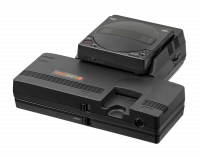
|
11V DC | 1.53 A | Tip negative | HES-ACA-02 | WSU120-2000-R13 | 5.5 x 2.5 mm barrel jack | External | Note that this is for the dock; the CD player portion (HES-CDR-01) uses the same AC adapter as the TG-16 console when used as a standalone CD player. Also note that the TG-CD dock will not power up properly with anything less than 10V, and the CD player will not read discs when docked |
| NEC SuperGrafx | 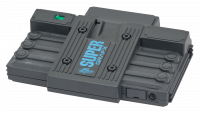
|
9V DC | 800 mA | Tip positive | PAD-113 | ? | 6.3 x 3.0 mm barrel jack | External | |
| NEC TurboExpress/PC Engine GT | 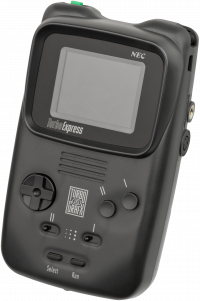
|
7V DC | 700 mA | Tip positive | HES-ACA-04 (US), PAD-121 (JP) | ? | 3.5 x 1.35 mm barrel jack | External or six internal AA-cell batteries | |
| NEC TurboDuo/PC Engine Duo | 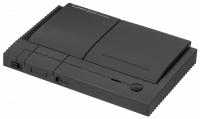
|
10V DC | 1 A | Tip positive | HES-ACA-05 (US), PAD-124 (JP) | ? | 6.3 x 3.0 mm barrel jack | External | NEC also released an external battery pack for the Duo in Japan only |
| NEC Super CD-ROM2 | 12V DC | 1 A | Tip positive | PAD-125 | ? | 6.3 x 3.0 mm barrel jack | External | The Super CD-ROM2 also has a jumper cable which passes through power to the connected PC Engine console. This cable plugs into a 3.5 mm x 1.35 mm barrel jack on the Super CD and then into the power jack on the PC Engine. | |
| NEC PC Engine LT | 9V DC | 700 mA | Tip positive | PAD-127 | ? | ? | External | ? | |
| NEC PC Engine Duo-R/Duo-RX | 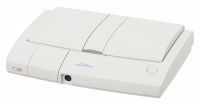
|
9V DC | 1 A | Tip positive | PAD-129/PAD-130 | ? | EIAJ-03 barrel jack | External | |
| Sega Genesis (model 1) * | 9V DC | 1.2 A | Tip negative | MK-1602 | WSU090-1300-R | 5.5 x 2.1 mm barrel jack | External | ||
| Sega Mega Drive (model 1) * | 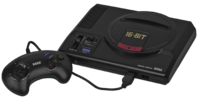
|
9V DC | 1.2 A | Tip negative | SA-160 (JP) | WSU090-1300-R | 5.5 x 2.1 mm barrel jack | External | |
| Sega Genesis (model 2) | 
|
10V DC | 850 mA | Tip positive | MK-2103 (US), SA-190 (JP) | ? | EIAJ-03 barrel jack | External | |
| Sega Genesis 3 | 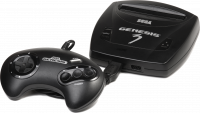
|
10V DC | 300 mA | Tip positive | MK-1479 | ? | EIAJ-03 barrel jack | External | |
| Sega Mega Jet | 10V DC | 850 mA | Tip positive | SA-190 | ? | EIAJ-03 barrel jack | External | ? | |
| Sega Genesis Nomad | 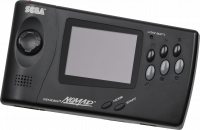
|
10V DC | 850 mA | Tip positive | MK-2103 | ? | EIAJ-03 barrel jack | External or six AA-cell batteries via clip-on pack or rechargeable battery via clip-on pack | ? |
| Sega 32X | 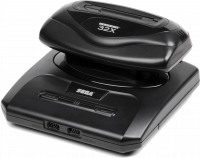
|
10V DC | 850 mA | Tip positive | MK-2103 (US), SA-190 (JP) | ? | EIAJ-03 barrel jack | External | Exactly the same as the model 2 Genesis/Mega Drive |
| Sega/Victor Wondermega RG-M1 | 9.5V DC | 1.5 A | Tip positive | AA-S95 | ? | EIAJ-03 barrel jack | External | ||
| Sega CDX | 
|
9.5V DC | 1.5 A | Tip positive | MK-4122 | ? | EIAJ-03 barrel jack | External | Do not use the MK-2103 AC adapter as it does not supply enough current |
| JVC X'Eye/Victor Wondermega RG-M2 | 9.5V DC | 1.5 A | Tip positive | AA-S95 (JP), AA-S95J (US) | ? | EIAJ-03 barrel jack | External | Same specs as the CDX AC adapter; as with the CDX do not use the MK-2103 AC adapter as it does not supply enough current | |
| Sega Game Gear * | 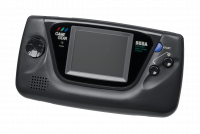
|
9V DC (JP/EU), 10V DC (US) | 850 mA or 1.2 A (JP), 850 mA (US), 1.2 A (EU) | Tip negative (EU/JP), tip positive (US) | SA-150 or SA-160 (JP), 2103/MK-2103 (US), 1605 (EU) | WSU090-1300-R (EU/JP) | 5.5 x 2.1 mm barrel jack (EU/JP), EIAJ-03 barrel jack (US) | External or six internal AA-cell batteries | European and Japanese Game Gears use the same AC adapter as the model 1 Mega Drive, whereas (for some reason) US models use a different AC adapter which was later used for the model 2 Genesis/Mega Drive |
| Nintendo Game Boy | 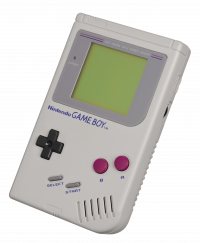
|
4.8V DC | 150 mA | Tip negative | DMG-003 | ? | ? | External or four internal AA-cell batteries | Also doubles as a rechargeable battery pack |
| Nintendo Game Boy Pocket | 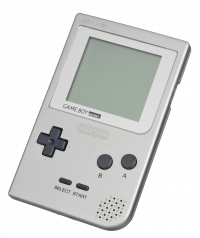
|
3V DC | 300 mA | Tip positive | MGB-005 | ? | ? | External or two internal AAA-cell batteries | ? |
| Super Nintendo (US) | 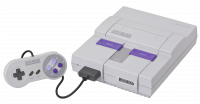
|
10V DC | 850 mA | Tip negative | SNS-002 | ? | 6.9 mm x 4.1 mm barrel jack with 0.7 mm inner pin | External | |
| Super Famicom * | 
|
10V DC | 850 mA | Tip negative | HVC-002 | WSU090-1300-R | 5.5 x 2.1 mm barrel jack | External | Exactly the same as the original Famicom |
| Super Nintendo (PAL) * | 9V AC | 1.2 A | Not applicable | NES-002 | ? | 5.5 x 2.5 mm barrel jack | External | Exactly the same as the PAL NES; the PAL SNES has a charge pump circuit which generates 12V DC for SCART autoswitching, hence the use of an AC power supply | |
| SNK Neo Geo AES * | 5V DC (PRO-POW models only), 10V DC (PRO-POW3/E models only) | 3 A (5V), 1 A (10V) | Tip negative | PRO-POW (5V) NEO-POW3 (10V) | WSU050-3000-R (5V), WSU090-1300-R (10V) | 5.5 x 2.1 mm barrel jack | External | Older AES consoles used a regulated 5V DC AC adapter while newer models had an unregulated 10V supply. Be *very* careful! | |
| SNK Neo Geo CD | 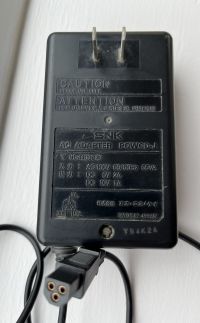
|
5V DC, 12V DC | 2 A (5V), 1 A (12V) | N/A, connector is keyed | POWCD-J (JP) | N/A | Three-pin connector, same as found on some Panasonic and Sony MSX2 models (though not the same pinout!) | External | ? |
| Pioneer LaserActive | 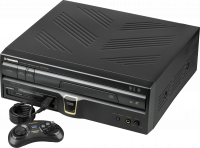
|
Input: 100V AC (JP), 120V AC (US) | ? | N/A, power cord is hardwired | N/A | N/A | N/A | Internal | ? |
Fifth generation of consoles
| Console | Pictures | Voltage | Amps | Polarity | Original PN | Replacement PN | Connection | Power Supply | Notes |
|---|---|---|---|---|---|---|---|---|---|
| Commodore Amiga CD32 | 5V DC, 12V DC | ? | N/A | ? | ? | 4-pin DIN | External | ? | |
| Panasonic 3DO | 
|
? | ? | ? | ? | ? | ? | ? | ? |
| Atari Jaguar * | 
|
9V DC | 1.2 A | Tip negative | 500273/PP-912 | WSU090-1300-R | 5.5 x 2.1 mm barrel jack | External | |
| Atari Jaguar CD * | 9V DC | 1.2 A | Tip negative | 500273/PP-912 | WSU090-1300-R | 5.5 x 2.1 mm barrel jack | External | Exactly the same as the Jaguar itself | |
| Bandai Playdia * | 9V DC | 850 mA | Tip positive | BA-002 | WSU090-1300 | 5.5 x 2.1 mm barrel jack | External | ||
| Sega Saturn | 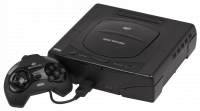
|
? | ? | N/A | ? | ? | C7 | Internal | North American consoles have a polarized connector |
| Sony PlayStation | 
|
? | ? | N/A | ? | ? | C7 | Internal | North American consoles have a polarized connector |
| Sony PSone | 
|
7.5V DC | 2 A | Tip positive | SCPH-112 (JP), SCPH-113 (US), SCPH-114 (EU), SCPH-115 (UK) | ? | EIAJ-03 barrel jack | External | Do not use a PS2 slim AC adapter! |
| NEC PC-FX | Input: 100V AC | ? | N/A, power cord is hardwired | ? | N/A | N/A | Internal | ||
| Casio Loopy | 24V DC | 1 A | Tip positive | AD-2410J | ? | 5.5 x 2.5 mm barrel jack | External | ? | |
| Apple Pippin | Input: 100-240V AC | ? | N/A | ? | N/A | C14 | Internal | ||
| Nintendo 64 | 
|
3.3V DC, 12V DC | 2.7 A (3.3V), 0.8 A (12V) | N/A, entire power supply is designed to only fit one way into the console itself | NUS-002 | ? | Proprietary connector | External |
Sixth generation of consoles
| Console | Pictures | Voltage | Amps | Polarity | Original PN | Replacement PN | Connection | Power Supply | Notes |
|---|---|---|---|---|---|---|---|---|---|
| Game Boy Advance | 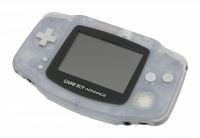
|
3.3V DC | 350 mA | N/A, connector is molded to only fit one way into the system | AGB-009 | ? | N/A, fits into battery bay | External or two internal AA-cell batteries | The original GBA does not have a dedicated AC adapter input like other Game Boy systems, all external AC adapters use the battery terminals |
| Game Boy Advance SP | 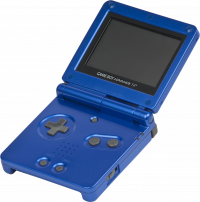
|
5.2V DC | 320 mA | N/A, connector is keyed | AGS-002 | Unofficial 5 V USB cables | Proprietary connector | External | |
| Game Boy Micro | 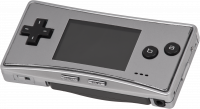
|
5.2V DC | 320 mA | N/A, connector is keyed | OXY-002 | Unofficial 5 V USB cables | Proprietary connector | External | |
| Sega Dreamcast | 
|
Input: 100V AC (JP), 120V AC (US), 220/240V AC (EU/UK); Output: 3.3V DC, 5V DC, 12V DC | ? | ? | ? | N/A | C7 | Internal | North American consoles have a polarized connector |
| Sony PlayStation 2 (original) | 
|
? | ? | ? | ? | ? | C7 | Internal | North American consoles have a polarized connector |
| Sony PlayStation 2 (slim, SCPH-7xxxx) | 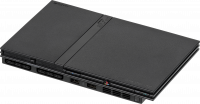
|
Input: 100V-240V AC; Output: 8.5V DC | Input: 1.5 A, Output: 5.65 A | Tip positive | SCPH-70100 | ? | EIAJ-03 barrel jack | External | |
| Sony PlayStation 2 (slim, SCPH-9000x) | 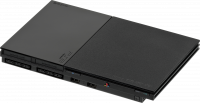
|
Input: 100-240V AC; Output: 7.5V DC | Output: 4.5 A | N/A | ? | ? | C7 non-polarized | Internal | Power supply is multivoltage despite what is indicated on the outside of the console |
| VM Labs Nuon | File:Nuon-N2000-wController-L.jpg | Input: 120V AC | ? | N/A, power cord is hardwired | ? | ? | N/A | Internal | ? |
| Microsoft Xbox | 
|
? | ? | ? | ? | ? | C7 non-polarized | Internal | |
| Nintendo GameCube | 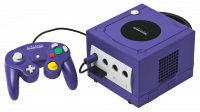
|
12V DC | 3.25 A | N/A, connector is keyed | DOL-002 | ? | Proprietary connector | External |
Seventh generation of consoles
| Console | Pictures | Voltage | Amps | Polarity | Original PN | Replacement PN | Connection | Power Supply | Notes |
|---|---|---|---|---|---|---|---|---|---|
| Nintendo DS | 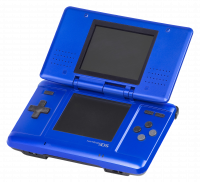
|
5.2 V DC | 320 mA | N/A, connector is keyed | AGS-002 | Unofficial 5 V USB cables | Proprietary connector | External | Same as GBA SP except for console name removed from sticker |
| Nintendo DS Lite | 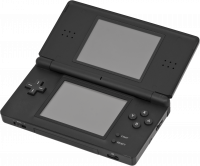
|
5.2 V DC | 450 mA | N/A, connector is keyed | USG-002 | Unofficial 5 V USB cables | Proprietary connector | External | Resembles Mini-USB B to the point a mangled connector can be directly and "correctly" connected |
| Nintendo DSi series | 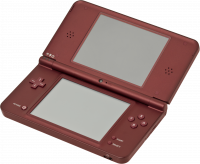
|
4.6 V DC | 900 mA | N/A, connector is keyed | WAP-002 | Still unofficially USB compatible | Proprietary connector | External | Originally invented for Nintendo/Buffalo WAP-001 Wi-Fi access point |
| Sony PSP (except N1000/Go) | 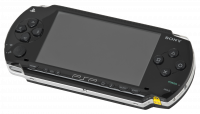
|
5 V DC | EP: 1500 mA, LP: 2000 mA | Negative ground | PSP-100 (two piece), PSP-103 (fixed cable) | Third party USB-based cables; official USB charging (if console can boot, not on 1000 series) | EIAJ-02 (4.0/1.7 mm barrel) | External | |
| Sony PSP-N1000 series (Go) | 5 V DC | 1500 mA | USB-A | PSP-N100 (laptop style three piece), PSP-N104 (wall wart two piece) | PC/generic USB power supply? | Electrically USB-A, but in recessed position requiring a long and specially notched plug | External | ||
| Nintendo Wii | 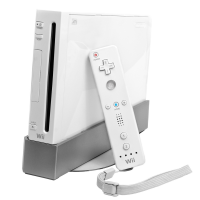
|
12V DC | 3.7 A | N/A, connector is keyed | RVL-002 | ? | Proprietary connector | External | |
| Microsoft Xbox 360 (Xenon/Zephyr) | 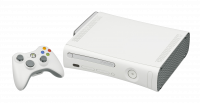
|
Output: 12V DC, 5V DC | 16.5 A (12V), 1 A (5V) | N/A, connector is keyed | DPSN-186CB-1A | ? | Proprietary connector with central and overline tabs | External | Forwards compatible |
| Microsoft Xbox 360 (Falcon/Opus) | Output: 12V DC, 5V DC | 14.2 A (12V), 1 A (5V) | N/A, connector is keyed | ? | ? | Proprietary connector with overline tab | External | Forwards compatible | |
| Microsoft Xbox 360 (Jasper/Kronos) | Output: 12V DC, 5V DC | 16.5 A (12V), 1 A (5V) | N/A, connector is keyed | ? | ? | Proprietary connector with split overline tabs | External | ||
| Microsoft Xbox 360 S | 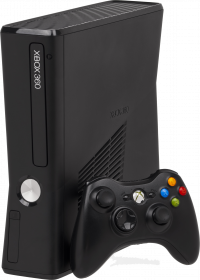
|
Output: 12V DC, 5V DC | 9.6 A (12V), 1 A (5V) | N/A, connector is keyed | PB-2121-03MX | ? | Proprietary double barrel jack connector | External | ? |
| Microsoft Xbox 360 E | 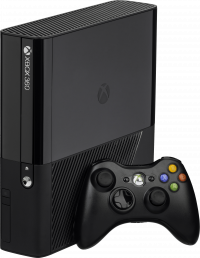
|
Output: 12V DC, 5V DC | 9.6 A (12V), 1 A (5V) | N/A | DCGP FJ-1 | ? | Proprietary barrel jack connector | External | ? |
| Sony PlayStation 3 | 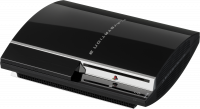
|
Input: 100V-240V AC (most models), 220V-240V AC (early PAL models) | ? | ? | ? | ? | C14 (original models), C7 non-polarized (Slim and Super Slim models) | Internal | Detailed information can be found here. |
| Sony PlayStation 3 standard controller/keyboard/headset | 5 V | 2x 500 mA | USB-A | CECHZA1 | PS3 console, compatible (handshaking) USB hosts | C7 to two USB-A | External | ||
| Sony PlayStation 3 Move controller | 5 V | ? | ? | CECH-ZCC1 | ? | Barrel jack, unspecified | External |
Eighth generation of consoles
| Console | Pictures | Voltage | Amps | Polarity | Original PN | Replacement PN | Connection | Power Supply | Notes |
|---|---|---|---|---|---|---|---|---|---|
| Nintendo 3DS/2DS Series incl. New | 4.6 V DC | 900 mA | N/A, connector is keyed | WAP-002 | Still unofficially USB compatible | Proprietary connector | External | Eventually replaced with cost-cutting revision (thinner cable) | |
| Sony PS Vita | 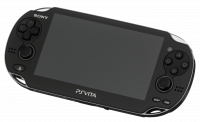
|
5 V DC | 1 A (?) | USB-A | PCH-ZAC1 | Official USB charging | Electrically USB-A, but in recessed position requiring a long and specially notched plug | External | Connects to model specific data cable (1000 series: proprietary, 2000 series: micro-USB B) |
| Sony PS Vita TV | 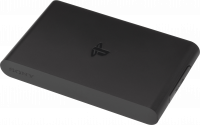
|
5 V DC | 2000 mA | Negative ground | PDEL-100 | PSP power bricks and their equivalents | EIAJ-02 (4.0/1.7 mm barrel) | External | Recycled from developer Vita |
| Nintendo Wii U | 
|
15V DC | 5 A | N/A, connector is keyed | WUP-002 | ? | Proprietary connector | External | Connector is very similar to the original Wii but is not compatible (colored yellow for identification). Unofficially[8] multivoltage. |
| Nintendo Wii U GamePad | 4.75 V DC | 1.6 A | N/A, connector is keyed | WUP-011 | Still unofficially USB compatible | Proprietary connector | External | Just barely enlarged 2/3DS/i/XL connector. Unofficially multivoltage. | |
| Sony PlayStation 4 (original) | 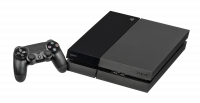
|
Input: 100-240V AC | ? | ? | ? | ? | C7 non-polarized | Internal | |
| Sony PlayStation 4 (slim) | 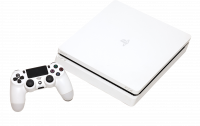
|
Input: 100-240V AC | ? | ? | ? | ? | C7 non-polarized | Internal | |
| Sony PlayStation 4 Pro | 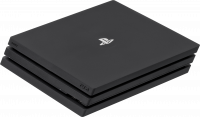
|
Input: 100-240V AC | ? | ? | ? | ? | C17 (CUH-7000 and -7100 models), C7 non-polarized (CUH-7200 models) | Internal | |
| Microsoft Xbox One | 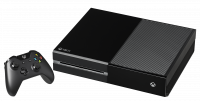
|
Input: 100-127V AC (JP/US), Output: 12V DC, 5V DC | 16.5 A (12V), 1 A (5V) | PB-2201-02MX | ? | ? | Proprietary connector, same as the 360 S | External | |
| Microsoft Xbox One S | 
|
Input: 100-240V AC | ? | ? | ? | ? | C7 non-polarized | Internal | |
| Microsoft Xbox One X | 
|
Input: 100-240V AC | ? | ? | ? | ? | C7 non-polarized | Internal | |
| Nintendo Switch | Input: 100-240V AC, Output: 5V DC, 15V DC | 1.5A (5V), 2.6A (15V) | N/A, connector is reversible | HAC-002 | ? | USB-C | External | Not fully USB-PD compliant. Compatible 15V power supply required for dock. |
Ninth generation of consoles
| Console | Pictures | Voltage | Amps | Polarity | Original PN | Replacement PN | Connection | Power Supply | Notes |
|---|---|---|---|---|---|---|---|---|---|
| Sony PlayStation 5 | ? | ? | ? | ? | ? | C7 non-polarized | Internal | ||
| Microsoft Xbox Series S | ? | ? | ? | ? | ? | C7 non-polarized | Internal | ||
| Microsoft Xbox Series X | ? | ? | ? | ? | ? | C7 non-polarized | Internal |
References
- "Quality PSU’s For Classic Consoles".
- "Triad Brand Replacement Power Supplies". Retrieved 2009-09-05.
- ↑ https://shmup.fandom.com/wiki/Tate_Mode
- ↑ https://www.doesitflip.com/
- ↑ https://shmups.system11.org/viewtopic.php?f=1&t=60868
- ↑ https://store.steampowered.com/curator/14416124/
- ↑ https://retronauts.com/article/946/the-comprehensive-list-of-flip-grip-friendly-vertical-games-for-switch
- ↑ http://www.gamepilgrimage.com/content/games-tate-mode-standard-definition
- ↑ https://www.reddit.com/r/NintendoSwitch/comments/85fqso/list_of_switch_games_that_support_nonstandard/
- ↑ [1]
